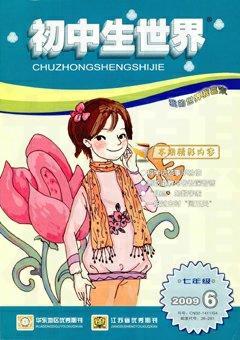can与could用法解析
颜景泉
情态动词can和could的用法是七年级英语教材中的重点语法项目之一,也是中考英语考查热点之一。为了帮助同学们更好地运用情态动词can和could,现将二者的用法解析如下。
一、can的用法通常有以下三种:
A.表示能力。can表示能力时,意思是“能、会”,“不能、不会”则用cant。例如:
1. I can speak a little English. 我能讲一点英语。
2. He can climb a tree. 他会爬树。
3. I cant swim. 我不会游泳。
其一般疑问句的结构是:Can + 主语 + 动词原形?肯定回答是:Yes, 主语 + can.否定回答通常是(有时比较灵活):No, 主语 + cant.例如:
1. — Can you sing this song in English?你能用英语唱这首歌吗?
— Yes, I can. 我能。
2. — Can you climb a tree?你会爬树吗?
— No, I cant. / Sorry, I cant. 不会。/ 对不起,我不会。
[中考链接]
1. —_________ you speak Japanese? — No, I cant.(2008年北京市)
A. Can B. Must C. May D. Should ( A )
2. — Can you finish the work in two days?
— Sorry, I_________ . My Computer doesnt work. (2008年湖北襄樊)
A. dont B. cant C. mustnt D. neednt ( B )
B.表示请求许可。can除了表示能力之外,还可以表示请求许可,这时相当于may。can与may可以互换使用,但can语气没有may严肃,口语中常用can。在非正式地请求许可时,其句型结构是:Can I...?(我可以 / 能……吗?),其回答比较灵活。肯定回答常见的有:Yes, you can. / Yes, please. / Certainly. / Of course. / Sure.等。否定回答常见的有:No, you cant / mustnt. / Sorry, Im afraid not.等。例如:
1. — Can I have a look at your photo,Pingping?平平,我能看一看你的照片吗?
— Certainly.当然可以。
2. — Can I use your ruler?我能用一下你的尺子吗?
—Sorry. Im using it myself. 对不起,我正在用呢。
[中考链接] 1. — Tom, can I borrow your book Children Soup?
— Sorry , I___________ it to Mary. (2004年河南省)
A. lent B. have lent C. had lent D. lend ( A )
2. — Can I get you a drink?
—__________ . I have already got one. (2005年甘肃省)
A. Thats very nice of you B. No, you dont have to
C. Yes, please D. With pleasure ( A )
C.表示可能性。can表示可能性时,主要用否定形式,指在客观情况下理论上的可能。例如:
1. — Bill, is the pink coat Andys?比尔,这件粉红色的大衣是安迪的吗?
— No, it cant be hers. Hers is purple. 不,不可能是她的。她的大衣是紫颜色的。
2. — Li Hua is knocking at the door. 李华在敲门。
— It cant be Li Hua. She has gone to Shanghai.不可能是李华,她到上海去了。
3. He cant be a student. 他不可能是学生。
[中考链接] — My house is very near a busy street.
— It________ be very quiet.(2008年江苏盐城)
A. can B. must C. cant D. mustnt ( C )
二、could有以下几种用法:
A.表示能力。could表示过去做某事的能力,是can的过去式,意思是“能、会”。表示过去不能时要用couldnt。例如:
1. The girl could play the piano at the age of 5. 那个小女孩5岁时就会弹钢琴。
2. She couldnt dance in the past. 她过去不会跳舞。
B.表示请求许可、提问题或陈述看法。could用于疑问句表示请求许可或委婉提问题时,其回答与can一样,也比较灵活,但不能用could/couldnt。例如:
1. — Could you give me a hand?你能助我一臂之力吗?
— Yes, I can./ Certainly.当然可以。
2. — Could you help me carry these books to the classroom?你能帮我把这些书搬到教室里吗?
— Sorry, I cant. 对不起,我不能。
3. — Could you tell me how to use the computer?请告诉我怎样使用电脑好吗?
— Yes, please.好的,请吧。
C.could表示可能性或提建议。could表示可能性时,意思是“能、可能”;表示劝告、提建议时,意思是“应该”。例如:
1. It could rain this evening. 今天晚上可能有雨。
2. The news couldnt true. 这消息不可能是真的。
3. We could write a letter to our principal. 我们不妨给校长写封信。
4. You could do with a haircut. 你该理发了。
考点举例:根据汉语意思完成句子
1. 爸爸,请你给我买一个MP3好吗?
__________ you_________ me a MP3, Father? (Could, buy)
2. 请告诉我去银行怎么走好吗?
Excuse me,_________ you__________ __________which is the way to the bank? (could, tell me)
[中考链接]1. —Excuse me, could you please help me carry the heavy box?
—__________ . (2005年河南省)
A. Yes, I could B. It doesnt matter
C. With pleasure D. Dont mention it (C)
2. 你能告诉我这本书你借多久了吗?
Could you tell me_________?(2008年江苏常州)
(how long you have had/kept this book)

